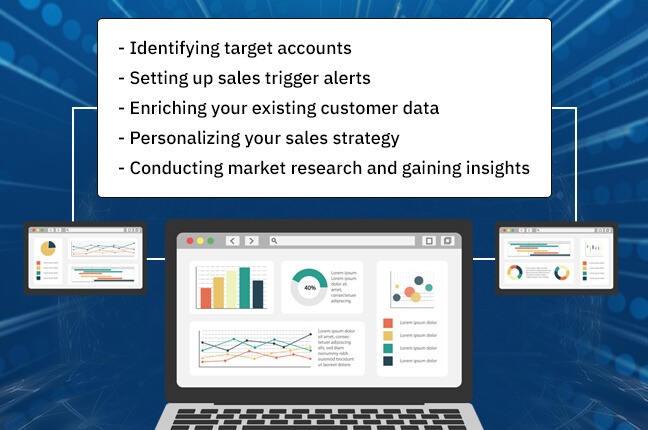This means companies must adopt sales intelligence tools and sales intelligence systems to become more intelligent in their sales processes if they want to convert prospects into clients. How can they achieve intelligent deals? By keeping track of every bit of sales intelligence data about their company, market, and competitors, they gain a competitive edge and increase deal closure rates.
This is precisely what sales intelligence is designed for. Below, we’ll define what is sales intelligence, explore marketing and sales intelligence solutions, and highlight how automated sales intelligence and predictive sales intelligence help close more deals.
What is sales intelligence?

Sales intelligence definition: the process of gathering and analyzing sales intelligence data from multiple sources such as news feeds, social media, company databases, and public filings to understand the context and behavior of prospects.
It can also be referred to as a focused extension of marketing and sales intelligence, particularly useful for b2b sales intelligence analyst techniques. This involves applying actionable sales intelligence to help sales teams understand buyer preferences, corporate history, and financial performance, thereby aligning outreach with client objectives.
According to Forbes, buyers report having higher expectations from sellers. They expect sales reps to understand buyer preferences and focus on helping buyers achieve their goals rather than making a quick sale. Thus, a deeper insight into a buyer’s corporate history, financial performance and preferences is necessary for sales teams to determine their intent. Sales intelligence helps to bridge the gap between your sales team and your prospects, as well as sales and marketing, enhancing the sales conversation and helping to move negotiations with potential clients forward. When executed effectively, sales intelligence can be the greatest tool ever to grace your sales team’s arsenal.
Why is sales intelligence important?

Sales intelligence importance lies in its ability to intelligence data helps sellers uncover prospect intent, monitor key accounts, and prioritize high-quality leads using buying intelligence insights. As organizations increasingly adopt predictive sales intelligence and lead intelligence solutions, sales success becomes rooted in real-time insights rather than outdated contact lists.
Modern firms deploy sales intelligence solutions to stay ahead, and also for its proven effectiveness and benefits. Let’s take a look at them below.
What are the benefits of sales intelligence?

Sales intelligence exists for the sole purpose of keeping salespeople informed, and help them perform their job better. Here are some of the several benefits it offers to salespeople.
1. Increased productivity
When you continuously monitor your prospects through sales intelligence, it becomes easier to understand their intent, and identify those prospects who are actively engaged in a buying decision based on the content on their website, news and other sources. This approach saves time and effort, which would have been wasted chasing low-interest leads.
Using sales tracking software and sales intelligence products further helps your teams utilize their time better to create intelligent sales solutions for focused outreach.
2. Better Conversations
Most of the time, conversations with prospects are less about the product or service and more about their goals, pain points, hesitations, preferences, etc. But unless your salespeople know about these, conversations are going to turn out drab.
Sales intelligence helps you identify prospects’ interests and craft the right talking points, steering the conversation in a direction where you get positive responses. Account intelligence software and marketing account intelligence data also enable reps to craft personalized messages based on known pain points, preferences, or recent developments.
3. Shorter Sales Cycle
Salespeople often chase the wrong prospects due to a lack of sales intelligence, which makes the sales cycle unnecessarily long. Targeting one decision-maker in your target account is much better than targeting 10 employees who ‘might’ be able to influence the decision-maker. This requires insights to understand intent, and to create personalized content for the decision-maker by leveraging said insights. This reduces average lead to close time.
4. Better Sales Strategy
Informed planning leads to better sales strategies. Sales intelligence can help the sales leadership understand their prospects and their buying behavior better, allowing them to build sales strategies that better engage prospects and improve lead conversion.
How to find the right sales intelligence data?

Account intelligence data is much more than a list of names, phone numbers and email addresses. As mentioned before, you need to understand who your ideal buyers are before you approach them. There are three things that must be determined before you target a buyer, and you’ll need specific data in order to do that. Let’s have a look at what those three things are:
- 1. Suitability:
- First, you must collect data on whether a prospect is a right fit for your product/services. You’ll need information such as the company
rofile, contact profile and financial profile to determine their suitability. - 2. Intent:
- Intent simply means if your prospect is interested in a product or service such as yours. To determine intent, you’ll need data on their marketing activity and social media activity, as well as any other sales triggers in the news that link the prospect to the need for a solution.
- 3. Opportunity:
- Third, you monitor your accounts for opportunities such as leadership changes, new sources of funding, and/or acquisitions, which can act as signals to pursue them aggressively.
Now let us understand the different ways you can look for sales triggers or buying signals, and then gather target accounts based on their suitability, intent and opportunity.
1. By reading articles in industry journals and other publications such as case studies, e-books, solution pages etc. that might point to organizations that could benefit from your product/service
2. By following and monitoring companies on social media (this includes prospects and their competitors)
3. By monitoring your competitors and their key accounts, identifying prospects that might be dissatisfied with your competitors’ offerings, and getting them onboard
4. By monitoring the news related to your prospects or news in which they are mentioned
5. By attending webinars and conferences related to your prospect’s industry
6. By identifying key events that could result in increased interest in your product or service
7. By reading analyst reports for guidance on market movement
Doing all of this manually requires a good amount of time, effort and resources to be spent on gathering sales intelligence. Most organizations these days simply use a sales intelligence platform or software to automate all of this, and thus save time and effort.
How can a sales intelligence software help your organization?

A robust sales intelligence software does more than just provide contact details, in a way that it empowers your teams to make informed, timely, and strategic decisions. From automated sales intelligence to account-level personalization, here’s how modern sales intelligence platforms can help organizations grow smarter and close more deals:
1. Identifying target accounts
Using B2B sales intelligence tools, you can identify individuals and companies that align with your ideal customer profile (ICP). These tools leverage sales intelligence data and predictive analytics to help pinpoint high-intent buyers, ensuring your outreach is directed at the most promising prospects. This kind of buying intelligence helps accelerate pipeline growth and reduce churn.
2. Setting up sales trigger alerts
Today’s leading sales intelligence solutions offer real-time sales trigger alerts that notify you of relevant events like leadership changes, funding announcements, or product launches, empowering you to act faster. With automated sales intelligence, sales reps no longer have to manually scan news or social feeds. Instead, sales and marketing intelligence platforms do the heavy lifting, delivering timely updates straight to your inbox or CRM.
3. Enriching your existing customer data
A good sales intelligence system integrates seamlessly with your customer data, acting as a lead intelligence solution that fills in gaps across your CRM or database. From firmographic and technographic data to intent and engagement metrics, these tools deliver domain data for sales intelligence that helps your team qualify leads more accurately and plan outreach better.
4. Personalizing your sales strategy
The more detailed the intelligence, the more personalized sales strategies you can craft. Sales intelligence tools provide deep insights into your prospects’ challenges, digital behavior, and company structure. This enables sales performance intelligence that supports customized messaging and improves win rates. In short, intelligent sales solutions help convert more leads by speaking directly to buyer needs.
5. Conducting market research and gaining insights
When you know how many potential leads are out there, you can forecast and allocate resources more accurately. Comprehensive intelligence platforms like Contify offers not just B2B sales intelligence, but also market and competitive intelligence, helping teams identify new opportunities and monitor competitors in one platform. With sales intelligence reports, your team can forecast revenue, allocate resources wisely, and target high-quality accounts with confidence.
Whether you’re searching for the best sales intelligence software for small business, a scalable sales tracking software, or a powerful B2B sales intelligence platform, these tools are designed to streamline workflows, deliver actionable insights, and drive smarter decisions across the revenue cycle.
How Contify can help with sales intelligence?
At this point in the article, two things are perfectly clear:
– Triggering engaging conversations with your key accounts is essential to upsell/cross-sell, and finally drive revenue, and
– A sales intelligence platform is a much better option than doing it manually. Contify is not only a state-of-the-art market and competitive intelligence platform, but a powerful sales intelligence tool. Here’s how it can help you target key accounts to attain sales success through cross-selling/upselling and boost revenue.
1. Empowers your account executives
Trust is the foundation of account management, and sales intelligence tools like Contify give your account executives the data they need to build it. With insights gathered from over 200,000 business sources, Contify delivers near-real-time sales intelligence data on industry trends, prospect company updates, business initiatives, and competitor activities related to your target accounts.
This allows sales teams to initiate intelligent sales conversations, personalize outreach, and nurture accounts effectively. The platform transforms your team into a sales intelligence company within your organization—capable of driving high-value conversations that result in conversions.
2. Helps create powerful messaging and content
Great messaging drives great results. With Contify, sales and marketing teams can craft personalized messaging and high-impact content using account-level intelligence. Whether you’re targeting decision-makers or influencers, sales intelligence reports from Contify provide the lead intelligence and competitive context needed to make your content stand out.
By embedding actionable sales intelligence and thought-provoking insights into your communication, you can strengthen your narrative, gain attention, and build stronger relationships. This is how sales and marketing intelligence turns into results.
3. Facilitates sales operations
Contify streamlines your sales ops by offering smart filters, dynamic account intelligence, and robust targeting capabilities. You can either create a new list of accounts to be target accounts based on sales triggers such as evidence of interest, current vendor dissatisfaction, financial changes, changes in competitive tactics, growth, etc.
This level of precision is what separates a generic CRM list from a high-converting B2B sales intelligence platform.
Conclusion
Sales intelligence not only provides you with ammunition to use in your hunt for your ideal accounts, but it is also essential in this day and age where prospects are well-informed about the state of the market and expect personalized and relevant interactions with the sales function of the organization pursuing them. Thus, it is important for organizations to determine how they’ll gather sales intelligence data and how they’ll apply its insights to grow their client base and increase conversions.
Sales intelligence tools are the most preferred option to gather intelligence on key accounts nowadays, as they save a lot of time and manual effort, and can integrate with CRMs, sales enablement platforms, and other sales intelligence systems to make things easier for salespeople and drive meaningful actions.
Automated sales intelligence using such platforms helps build a centralized system full of clean, actionable insights and improves the quality of both leads and clients. Leveraging a B2B sales intelligence platform or lead intelligence solution can significantly enhance your ability to scale outreach and drive better results across your sales funnel.
Frequently asked questions
1. What is sales intelligence in B2B sales?
Sales intelligence in B2B sales refers to the process of collecting, analyzing, and applying sales intelligence data to identify, target, and engage potential buyers more effectively. It involves using B2B sales intelligence tools to gain insights into ideal customer profiles, buying intent, and account behavior.
2. How does sales intelligence help in lead generation?
Sales intelligence tools help in lead generation by identifying high-potential prospects based on intent signals, firmographic data, and behavioral insights. This automated sales intelligence ensures that sales teams focus only on leads most likely to convert.
3. What are the benefits of using a sales intelligence tool?
Using a sales intelligence platform allows businesses to automate research, identify buying triggers, enrich CRM data, and create personalized outreach. These tools improve lead quality, increase conversion rates, and shorten the sales cycle.
4. What’s the difference between sales intelligence and market intelligence?
Sales intelligence focuses on individual accounts and prospects, which helps with lead generation and deal execution. In contrast, market intelligence provides a broader view of market trends, competitor strategies, and industry developments.



